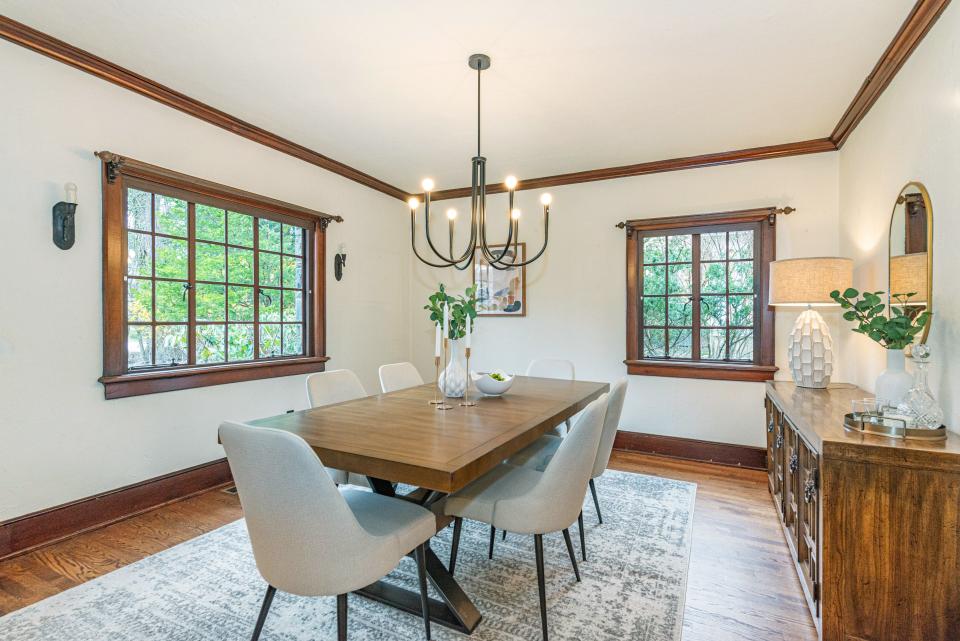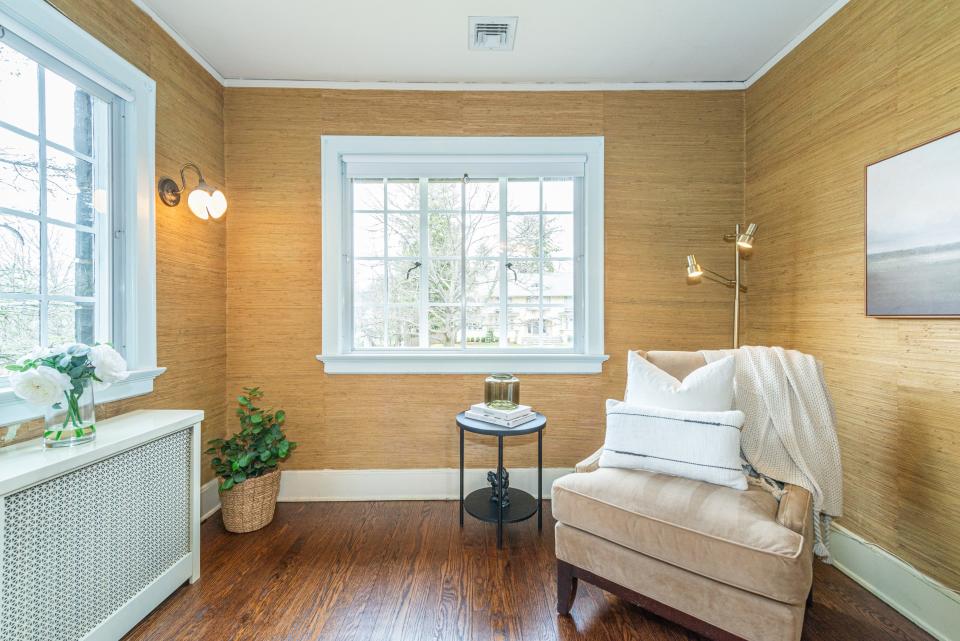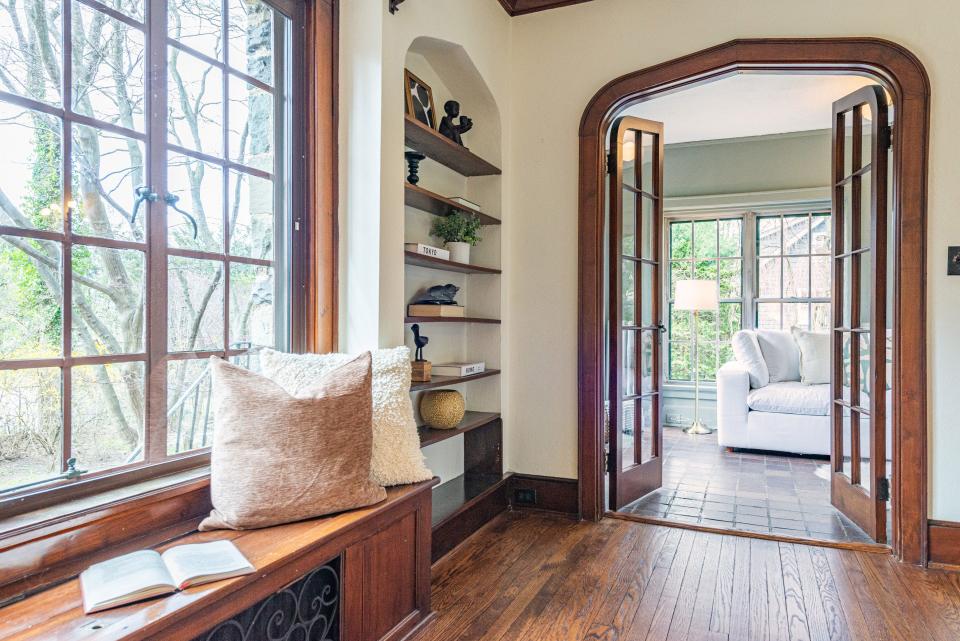North Jersey Tudor once home to 'brave' Holocaust survivor on the market for $1.25M
A rare stone Tudor Revival in northern Montclair has hit the market for the first time in 50 years.
The former home of a New York Philharmonic violinist, a Holocaust survivor who inspired an award-winning documentary and a chief engineer for the Westinghouse X-Ray Company, 176 Wildwood Ave. was listed this month by Karin Carson of Keller Williams NJ Metro Group for $1.25 million. Carson said the nearly 100-year-old home boasts a rich history as well as modern touches that make it a true standout even in Montclair.
"It's a special home," Carson said.
Since August 1973, the five-bedroom, five-bathroom home has been held by the Ravina family, particularly Oscar and Ruth Ravina. Oscar Ravina gave music lessons at 176 Wildwood, while Ruth Ravina provided his students with a listening ear and a shoulder to cry on, according to an account from Montclair State University, where the late couple has a scholarship award named in their honor.

Though they came to Montclair from Queens, the Ravinas were born in Warsaw, Poland and separately escaped a wartorn continent. Ruth Ravina, who died last July, was only 2 years old when her hometown of Kozienice, Poland fell under German occupation. The Germans confined Ravina, her family and the town's other Jewish residents into a designated quarter, kept them under guard and liquidated their belongings, according to Ravina and various historical accounts.
The Jews that weren't shot and killed were in September 1942 herded onto trains and shipped to labor camps. Few were forced to help the Germans plunder remaining items, demolish homes and repave roads with local tombstones.
Ravina, in an oral history she gave to the Yiddish Book Center in 2016, recounted surviving several camps along with her mother. Due to her age, Ravina said she was forced to hide most of the time. She kept an eye on watch towers, timed the movement of guards and mapped camp layouts to avoid detection. She also said she "got a little braver."
More: North Jersey home built for man who helped finance Empire State Building is on the market
That bravery would prove vital when Ravina and other children being hidden by their parents were discovered by a group of German officers. The children, 28 to 30 of them, were taken on a troop transporter to a hilltop outside the camp, where the officers berated them as "lazy slobs," she said. Ravina said she lingered as the guards converged around those first unloaded, and she was able to slip away.
"As I was running, I saw a figure, a woman's figure, in a blue cape," Ravina said. "She saw me running and opened her cape."

The woman did not take Ravina to freedom. A nurse at the camp, she instead shepherded Ravina to its infirmary. There, Ravina was eventually reunited with her mother. None of the other children returned to the camp, she said.
Ravina's story, which was documented in “An Inconvenient Time” by director Denny Klein and “The Invisible Holocaust: The Story of Ruth Ravina” by biographer Marlen Gabriel, took her through the Pionki labor camp and the one at Skarzykso-Kamienna. Her last stop was Czestochowa, where allied bombing allowed for a January 1945 jailbreak by a group of emaciated women who mustered the energy to overpower a locked gate, she said.
With rags on her feet, having long outgrown her shoes, Ravina said she remembered running east down the road as German soldiers were fleeing west along the roadside gutter.

Two days later, the surviving women found Russian soldiers. Ravina and her mother later returned to Kozienice, where they learned her father had died. She then went to Lodz, where her mother opened a soup kitchen before traveling to Sweden, Canada and, in 1948, the United States.
Once stateside, she graduated from the City College of New York with a sociology degree. She also met Oscar Ravina when her mother urged her to volunteer as an usher for a music event and he overheard her speaking fluent Polish. The first time she heard him play the violin, she "melted like butter," she said in 2016.
"My jaw dropped," she told the Yiddish Book Center. "I had never heard playing like that before. He had the most gorgeous sound – that's what he was known for, the sound."
A musical prodigy seven years her elder, Oscar Ravina was also born in Poland but was taken by his father to Russia at the onset of the war. Trained at the Warsaw Conservatory, the Saint Petersburg Conservatory in Leningrad, the Mozarteum in Salzburg and more, he came to America in 1950 to study at the Manhattan School of Music.

He worked at Radio City Music Hall before joining the New York Philharmonic in 1963 and performing with the New York Philharmonic Chamber Ensembles. He taught at Dartmouth College and Montclair State University where he was named professor emeritus and had former students establish the Ruth and Oscar Ravina Talent Award Scholarship. He also co-founded the Philharmonia Virtuosi of New York and the Ravina String Quartet and was the concertmaster of the New York Virtuosi.
The couple's longtime home was built in 1927-28 by the original owner Joseph Henry Scranton and his wife Clare Wallace Ellis. Though Scranton designed the home himself, according to a 1927 report in The Montclair Times, he sold it for $45,000 following the May 1930 death of Ellis, a prominent member of the Upper Montclair Women's Club, the State Federation of Women's Clubs and the League of Women Voters.
Featuring a renovated, eat-in kitchen with stainless steel appliances and quartz countertops, the home has recent updates and 20th-century details. The large living room has a custom fireplace mantle, original wall sconces and arched French doors leading to an adjacent sunroom. The primary suite has a sitting room, ensuite bathroom and walk-in closets. It sits on a third of an acre about midway between Watchung Plaza and the Upper Montclair train station.
The home's second owner was Morrison Montford of Chicago, according to The Montclair Times. Morrison was the chief engineer for the Westinghouse X-Ray Company in New York and racked up patents for gadgets ranging from aircraft speedometers to amplifier systems. His namesake son became a U.S. Army Air Forces pilot and served with the 450th Bombardment Group during World War II.
This article originally appeared on NorthJersey.com: North Jersey Tudor Revival home hits market in Montclair NJ
